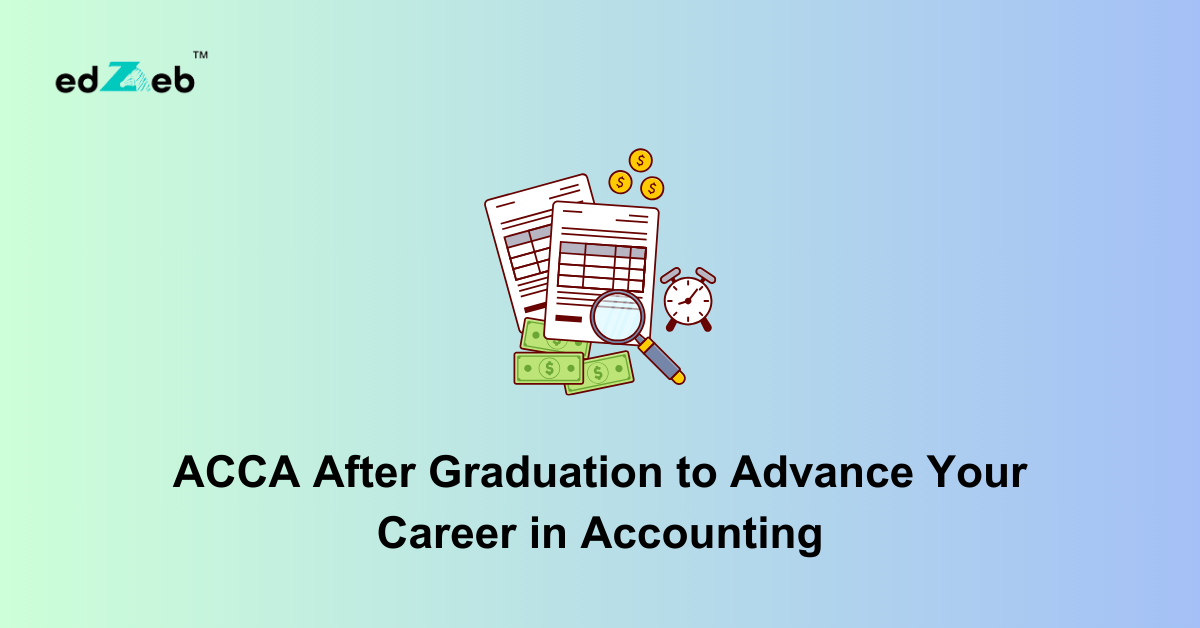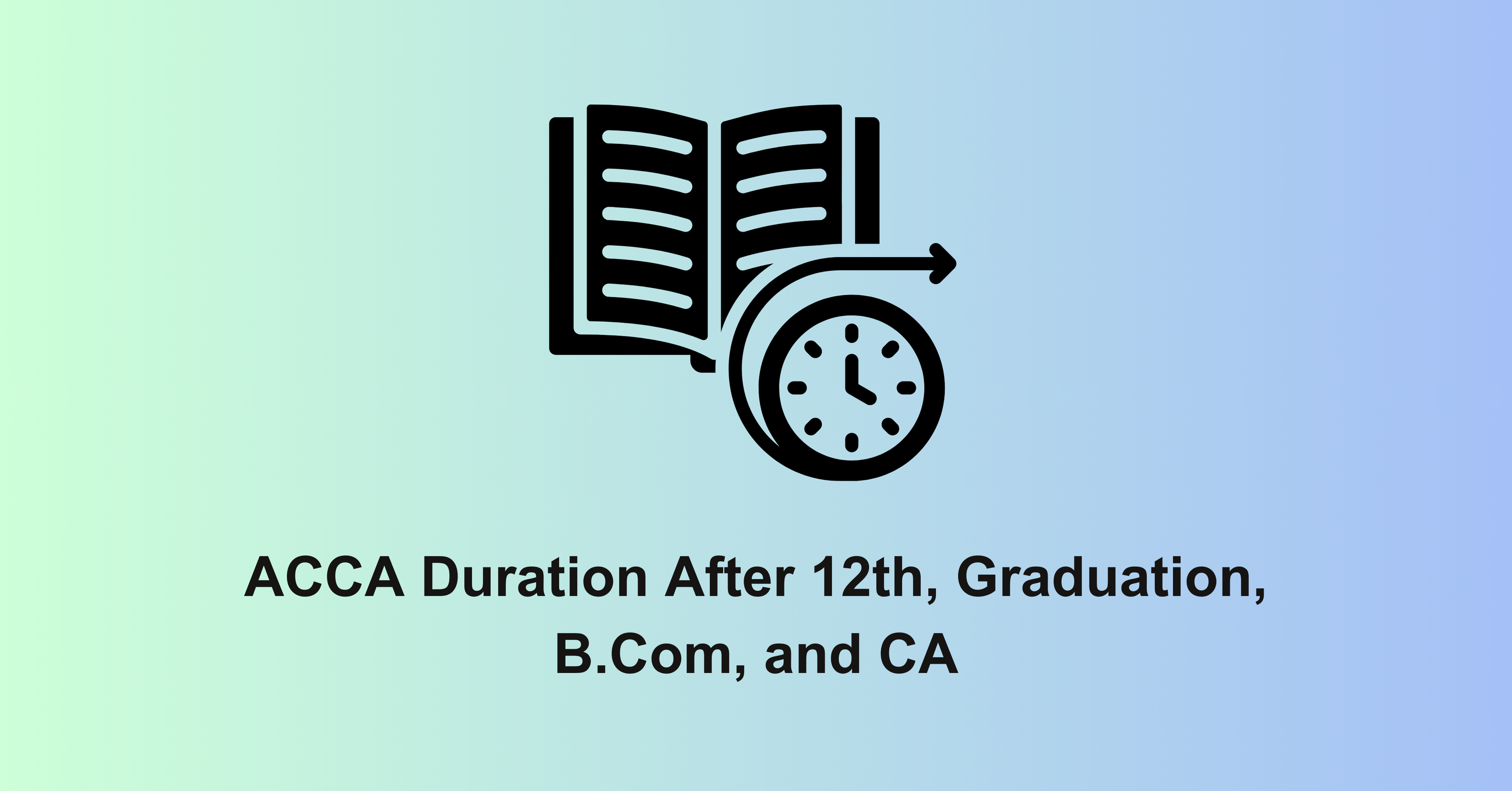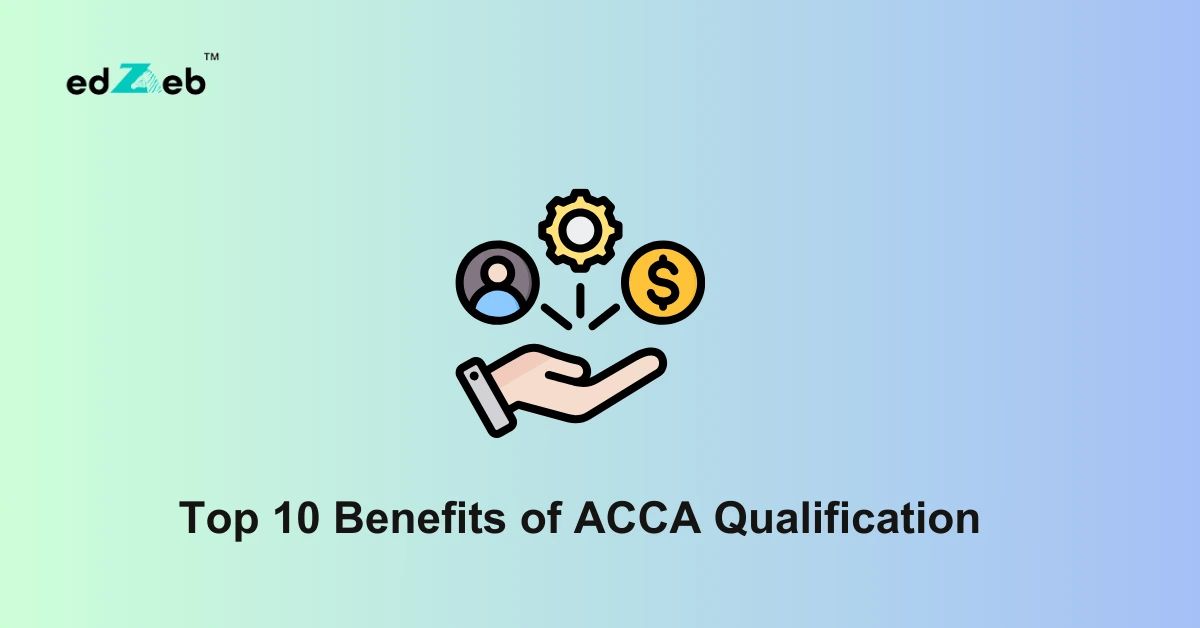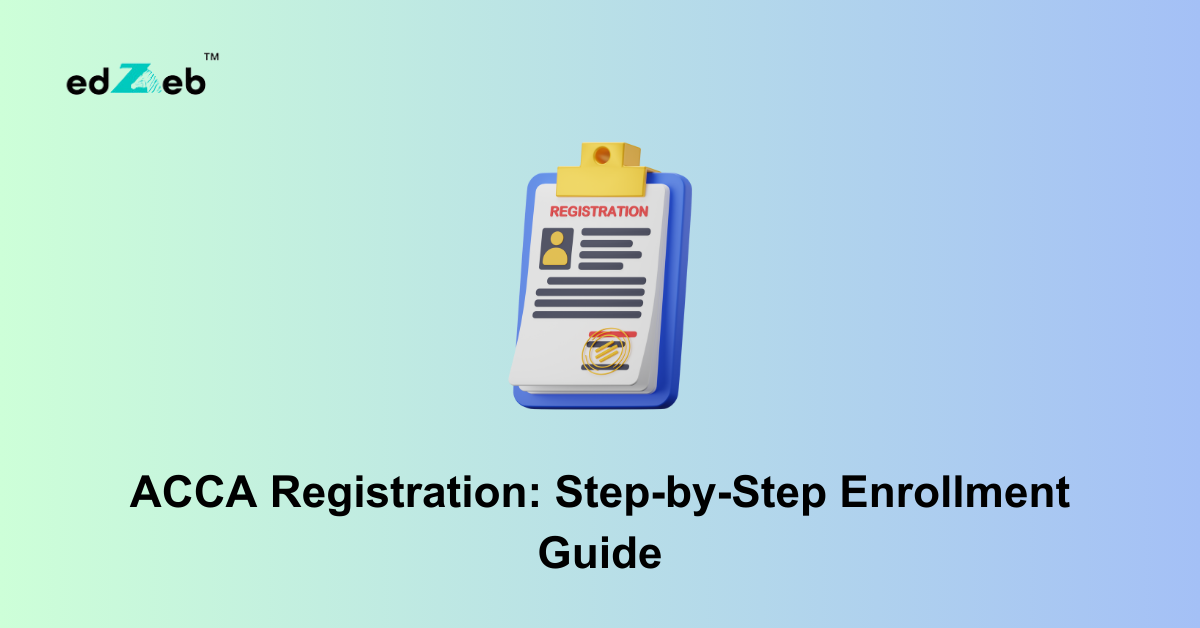
ACCA After Graduation is a popular pathway for students aspiring to excel in the fields of accounting and finance. We need forward-thinking financial professionals in our rapidly evolving digital environment. These individuals must be able to think creatively and positively and operate to the highest ethical and professional standards. It is expected by them to have the ability to understand the big picture. However, many wonder, Is ACCA Difficult? While the qualification demands dedication and effort, it is achievable with the right guidance and persistence.
Therefore, doing an ACCA course after graduation is the right choice if you want to work as a professional in this field.
Table of Contents:
What is ACCA?
All of the ACCA qualification’s applied knowledge and applied skills tests, together with the ethics and professional skills module, are included in the advanced diploma in accounting and business. Pursuing a Career in ACCA through this certification opens doors for many international jobs by making you a competent accountant.
| ACCA Curriculum | ||
| Level | Focus | Exams |
| Applied Knowledge | Foundational accounting and business knowledge | Business and Technology (BT) |
| Management Accounting (MA) | ||
| Financial Accounting (FA) | ||
| Applied Skills | Practical application of accounting and business skills | Corporate and Business Law (LW) |
| Performance Management (PM) | ||
| Taxation (TX) | ||
| Financial Reporting (FR) | ||
| Audit & Assurance (AA) | ||
| Financial Management (FM) | ||
| Strategic Professional | Strategic thinking and leadership | Strategic Business Reporting (SBR) – UK |
| Strategic Business Leader (SBL) | ||
| Advanced Financial Management (AFM) | ||
| ACCA Advanced Performance Management (APM) | ||
| Advanced Taxation (ATX) – UK | ||
| Advanced Audit and Assurance (AAA) | ||
Applied Knowledge Level helps you gain a broad understanding of essential accounting techniques such as effective business operations, management accounting and financial accounting.
Applied Skills Level develops the strong technical skills that are part of the strategic finance professional’s toolkit – including taxation, financial reporting, and audit.
Strategic Professional Level puts you in the role of an accountant in a range of real-world scenarios. You’ll develop critical professional workplace skills such as problem-solving, communication and negotiation.
Eligibility for ACCA After Graduation
ACCA Registration is open to every student aspiring to build a career in finance and accounting after graduation. With flexible entry points based on prior qualification, and experience you can get enrolled in the ACCA course after graduation across the globe. However, in India, you need to have
- 10th Pass Out certificate from a recognized board of education.
- 12th Pass Out from any stream in first division from a recognized school of education.
- Graduation or Post Graduate or any equivalent qualification.
- CA Intermediate or CA
- CMA (5+ Years Experience)
Candidates from any background aspiring to make a career in finance must fulfill the ACCA eligibility after graduation to gain this certification.
ACCA Duration After Graduation
The total ACCA course duration after graduation is from 2 to 3 years. However, ACCA course duration is influenced by various factors.
- First of all, it’s the flexibility of the Knowledge Level exams that can be taken at any time of the year. On top of that, the skill level and professional level exams are taken four times (every quarter) in a year – in March, June, September, and December. This flexibility of planning your exams according to your schedule impacts the duration of completing ACCA duration after graduation.
- All ACCA subjects after graduation are not to be cleared. Candidates who have already studied some of the ACCA subjects in their graduation get exempted and only the remaining ones shall be attempted to gain ACCA certification after graduation.
Therefore, read further and learn about the ACCA exam exemptions based on your graduation in various fields of study.
ACCA Exemptions After Graduation
You are exempted from various ACCA papers, once you enroll in ACCA program after completing your graduation.
Graduation Program | ACCA Exemptions | Remaining Papers |
B.Com / M.Com, BAF, BBI, BFM | ||
| – BCom (Bachelor of Commerce) | Knowledge Level: | 9 papers: |
– MCom (Masters in Commerce) | – Business and Technology (BT) | – 5 papers under Skill Level (except Corporate and Business Law) |
– BAF (Bachelor of Accounting and Finance) | – Management Accounting (MA) | – 4 papers under Professional Level |
– BBI (Bachelor of Banking and Insurance) | – Financial Accounting (FA) | |
– BFM (Bachelor of Financial Markets) | Skill Level: | |
– Corporate and Business Law (LW) | ||
Total Exemptions: 4 papers | ||
BBA / BMS (Finance) | ||
– BBA (Bachelor of Business Administration) | Knowledge Level: | 12 papers: |
– BMS (Bachelor of Management Studies) | – Business and Technology (BT) | – 2 papers under Knowledge Level |
Total Exemptions: 1 paper | – 6 papers under Skill Level | |
– 4 papers under Professional Level |
ACCA Exemptions for B.Com, BAF, BBI or BFM Graduates
The ACCA exemptions for commerce graduates having done BCom (Bachelor of Commerce), BAF (Bachelor of Accounting and Finance), BBI (Bachelor of Banking and Insurance), and BFM (Bachelor of Financial Markets) are eligible for 4 exemptions as follows:
Knowledge Level
- Business and technology (BT)
- Management Accounting (MA)
- Financial Accounting (FA)
Skill Level
- Corporate and Business Law (LW)
After availing of these 4 exemptions, students would need to clear the remaining 9 papers, 5 papers under skill level (except Corporate and Business Law), and 4 papers under professional level.
ACCA Exemptions for BBA / BMS (Finance) Graduates
BBA students and graduates of the BMS in Finance program are eligible for the ACCA Exemptions, which exempt them from one Knowledge level paper, Business and Technology (BT). Students will need to pass the final 12 examinations from all three courses in order to claim their exemption.
*Note: (2 papers under knowledge level, 6 papers under skill level and 4 papers under professional level)
Scope of ACCA After Graduation
There is a vast scope of ACCA course after graduation and it lets you explore numerous cross-border job opportunities in the finance and accounting domain.
| Sector | Job Role | Description | Average Salary (USD) | Demand Level |
Accounting & Finance | Management Accountant | Provides financial analysis, budgeting, forecasting, and cost control to support business decisions. | $60,000 – $85,000 | Very High |
Accounting & Finance | Tax Advisor | Advises on tax planning, compliance, and minimization strategies. | $55,000 – $90,000 | High |
Accounting & Finance | Financial Analyst | Analyzes financial data to assess investment opportunities, creditworthiness, and market trends. | $50,000 – $80,000 | Very High |
Consulting | Management Consultant | Advises businesses on strategy, operations, and financial performance improvement. | $65,000 – $120,000 (Depends on specialization) | High (Depends on specialization) |
Banking & Financial Services | Investment Banker | Raises capital for companies and governments, and advises on mergers and acquisitions. | $75,000 – $150,000+ (Depends on experience and performance) | High |
Corporate | Financial Controller | Oversees all financial activities of a company, including accounting, budgeting, and risk management. | $80,000 – $130,000 | High |
Non-Profit | Finance Director | Manages the financial resources of a non-profit organization. | $60,000 – $90,000 | Medium |
Benefits of Doing ACCA After Graduation
Let us now discuss the benefits of doing ACCA after graduation after knowing about its high scope across industries all over the globe.

Global Recognition
ACCA is a globally recognized qualification where candidates can pursue international career opportunities in various industries such as finance, consulting, banking, insurance, and more.
Career Opportunities
ACCA affiliates can choose to work in various job roles such as Financial Analyst, Tax Consultant, Risk Manager, Financial Controller, and Management Accountant in multinational corporations, accounting firms (like the Big Four), financial institutions, government agencies, and non-profit organizations.
Professional Growth
ACCA improves the credibility of the qualified candidates thus with experience they can step up the ladder to senior managerial roles within an organisation.
Continuous Learning
While working, you can keep up with your skills and knowledge through various Continuous Professional Development (CPD) programs to specialize in audit, taxation, financial management, or risk management to align with your career interests.
Networking Opportunities
The ACCA qualification offers vast networking opportunities through its community spread over 233,000 members and 536,000 students worldwide. ACCA also conducts events and online forums to engage with peers, industry leaders, and experts to build valuable connections.
Competitive Advantage
ACCA subjects after graduation lay a strong foundation of ethical and professional standards for that competitive edge in the job market.
Flexibility and Adaptability
The professional knowledge and the technical expertise learned during the ACCA course after graduation help you work across roles and industries for flexible career paths and the opportunity to work remotely or in different settings.
Conclusion
Pursuing an ACCA qualification after graduation can advance your career in finance and accounting. It offers a comprehensive skill set that is highly valued by employers worldwide. The scope for career advancement, high earnings, and international jobs make it a compelling option for graduates. While the journey demands dedication and hard work, the rewards in terms of professional growth and opportunities are significant.
FAQs
Is it worth doing ACCA after graduation?
Yes, definitely. You can do an ACCA course after graduation to avail various benefits like
- international career opportunities in various industries.
- networking opportunities through its community spread worldwide.
- professional knowledge and technical expertise and many more.
How many papers are there in ACCA after graduation?
There are thirteen papers in total categorised into three levels and exemptions for the ACCA subjects after graduation depend on what you have studied before.
How to do ACCA after degree?
After your graduation, check the eligibility and calculate exemptions if you get any. Then look for a reliable institute like edZeb providing ACCA classes in Delhi. It is an expert-led program and You can enroll yourself in their Offline as well as online sessions having high passing rates.









